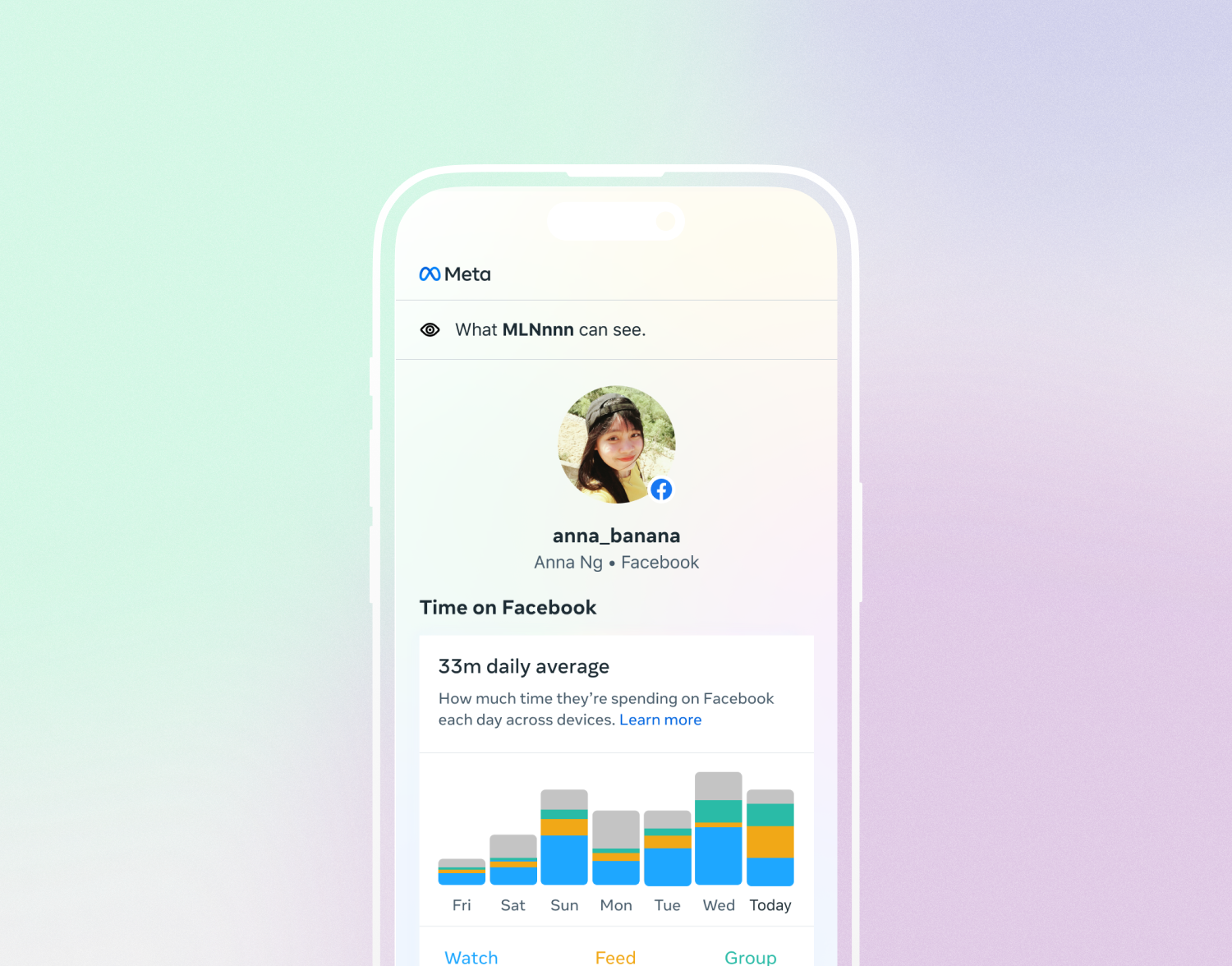
Product design: Facebook Parental Supervision

“There are approximately 10.7M active teens under 18 (5.6% of DAP) and approximately 700K teens sign up for Facebook. ”
Despite a 61% report from US teens feeling unconcerned about their social media use, many guardians are cautious, with 21% blocking Facebook access for their teens. Facebook was the most blocked app by guardians in 5 countries, and 65% of guardians would consider allowing access with added supervision tools. In response, Facebook's Privacy team launched a Parental Supervision experience starting in H2 2023, offering a set of tools designed to support teens (ages 13-17) and their parents. The supervision tools provide insights and control, allowing both parents and teens to feel safe and informed. Participation is optional and can be ended by either party at any time.
Beginning in May 2024, Meta is streamlining supervision management across its apps (Facebook, Instagram, Messenger, Meta Quest) via Family Center. Parents can now easily monitor and manage their teen’s activity across all platforms in one place, enhancing both convenience and peace of mind.
My role
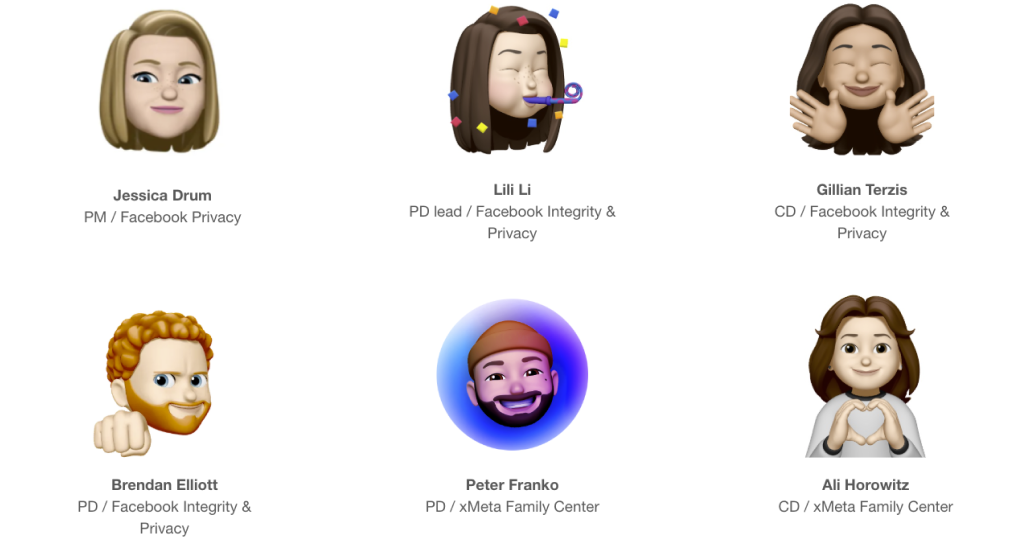
As Design Lead, I drove the creation and strategy for the Facebook Parental Supervision initiative, overseeing the design and execution of the MVP. I led multiple cross-functional design sprints with teams from Privacy, Integrity, and CSI, diving deep into teen digital behavior and user journeys. Through iterative design and testing, I developed and refined post-MVP concepts, gathering key insights that shaped the future direction of the product and enhanced its user experience.
Supervision User flow
Opportunity
1. Adapt to teens as they grow
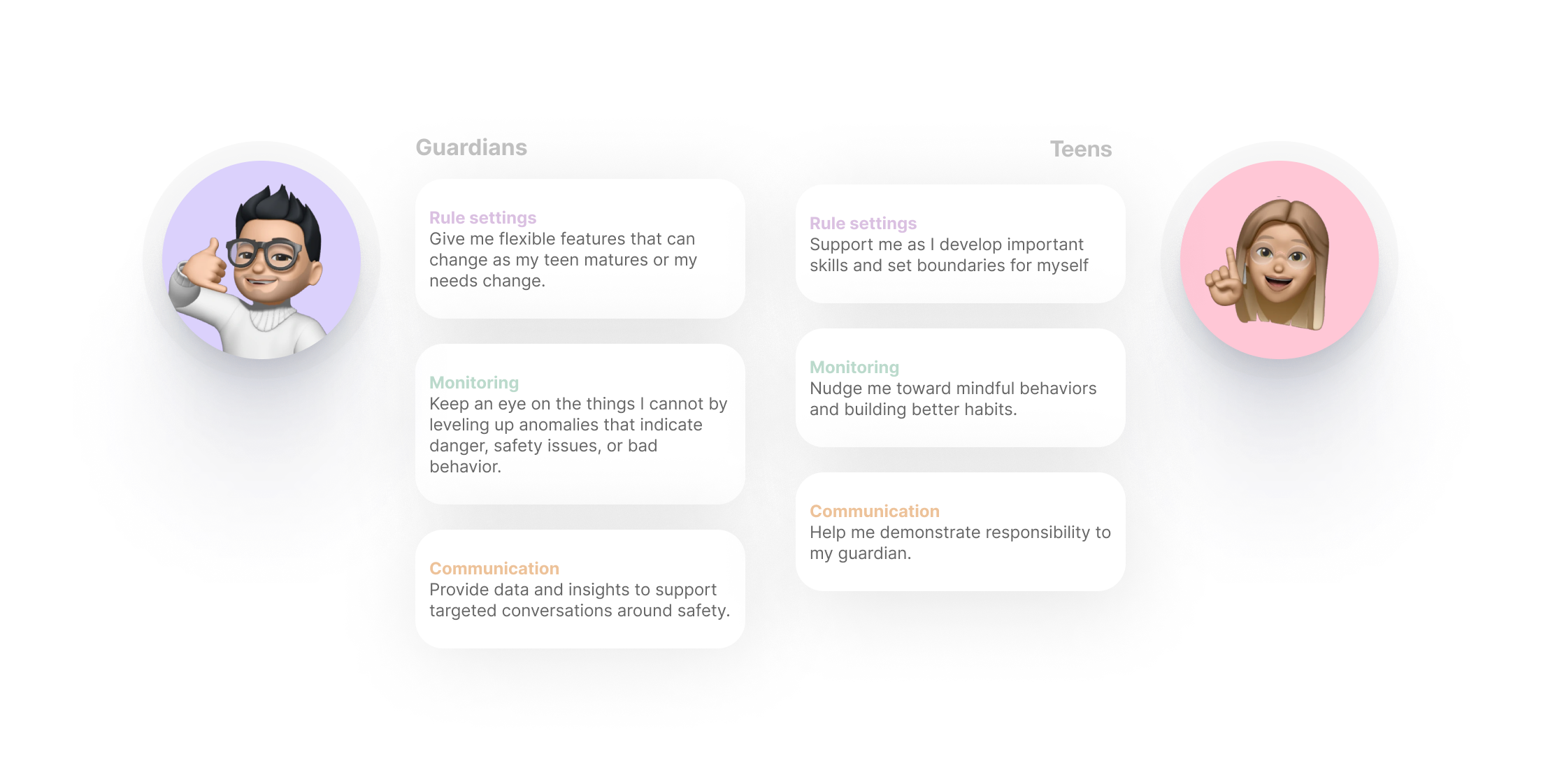
Teens represent a diverse user group with varying privacy needs based on age and maturity, which evolve as they grow. As teens mature, parents' roles shift from setting strict limits to fostering trust and open communication. Designing for these changing dynamics is key to creating effective supervision tools that add value for both teens and guardians.
What we did:
The Family Center initiative focused on achieving a strong product-market fit for early teens and their parents—during a critical time when families are looking to establish healthy social media habits.
We design features to provide value to teens as well as parents (e.g. screen time insights that teens can use to self-monitor, opportunities to revisit and renegotiate controls and insights as teens demonstrate maturity)
We provide flexible tools to guardians that enable them to shift from controls (e.g. screen time limits) to monitoring and conversation over time (e.g. screen time insights)
2.Provide opportunities for safe exploration
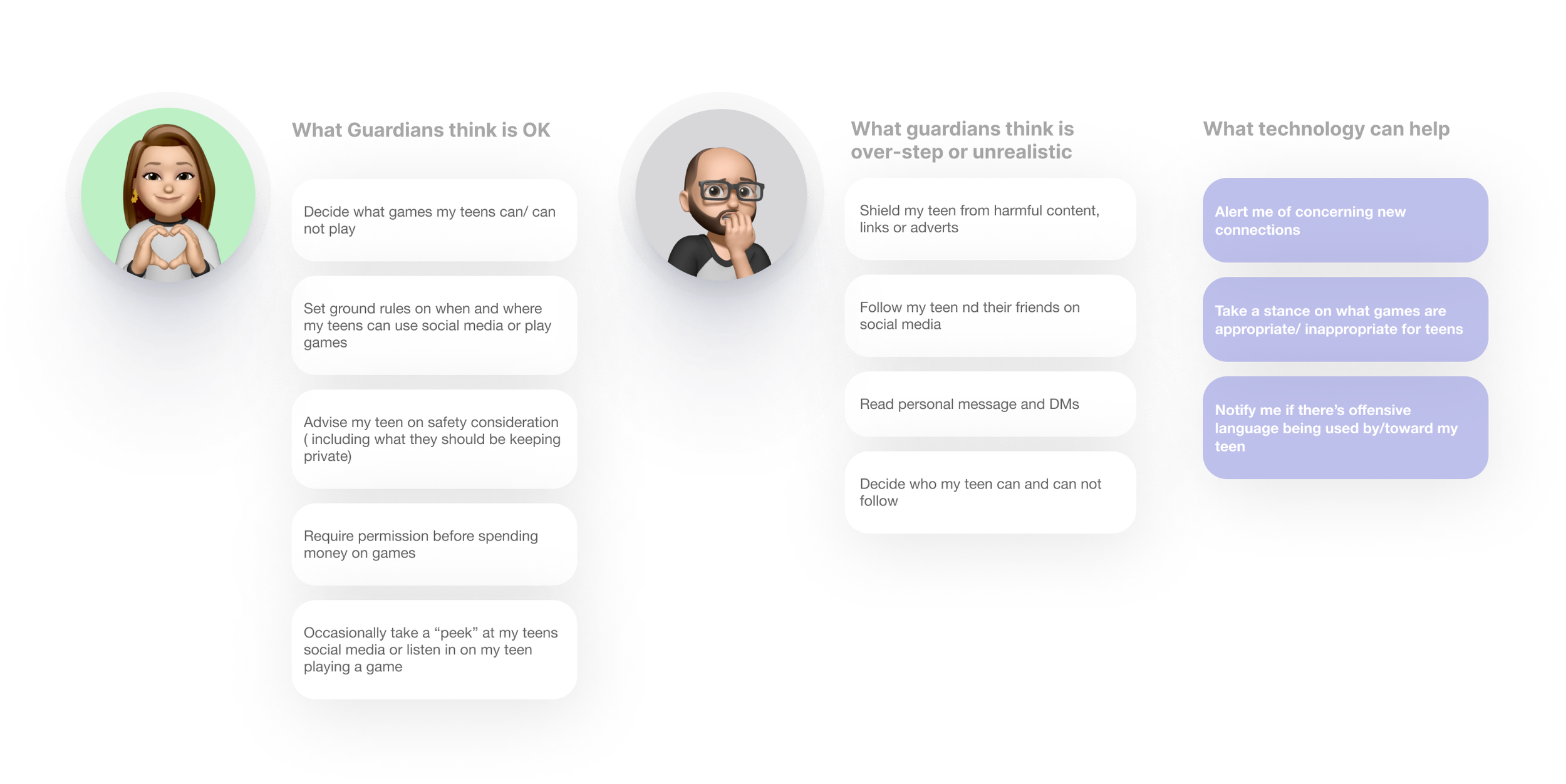
Social media helps teens explore their identities during a transitional phase, allowing them to express themselves in less vulnerable ways—through multiple accounts, disappearing content, or avatars. Guardians seek non-invasive tools for safe exploration, but overly intrusive methods can lead to rejection. The challenge is balancing supervision with respect for teens' privacy and autonomy.
What we did:
We provide tools for parents to supervise and set limited settings but also allow teens to have a voice. For instance, we require teens to opt into supervision to protect their privacy.
We avoid highly invasive monitoring tactics that might result in teen rejecting supervision (for instance, ability to see messaging content or who their teens are DMing).
We currently avoid showing specific content (e.g., what topics teens search for on IG) to protect teens' need for autonomy and exploration (e.g., of their sexual orientation, political orientation, religious belief).
We allow families to customize their own experiences within limits (e.g., decide on which settings to apply) to account for that they may have unique needs.
3. Support guardians and demystify social media
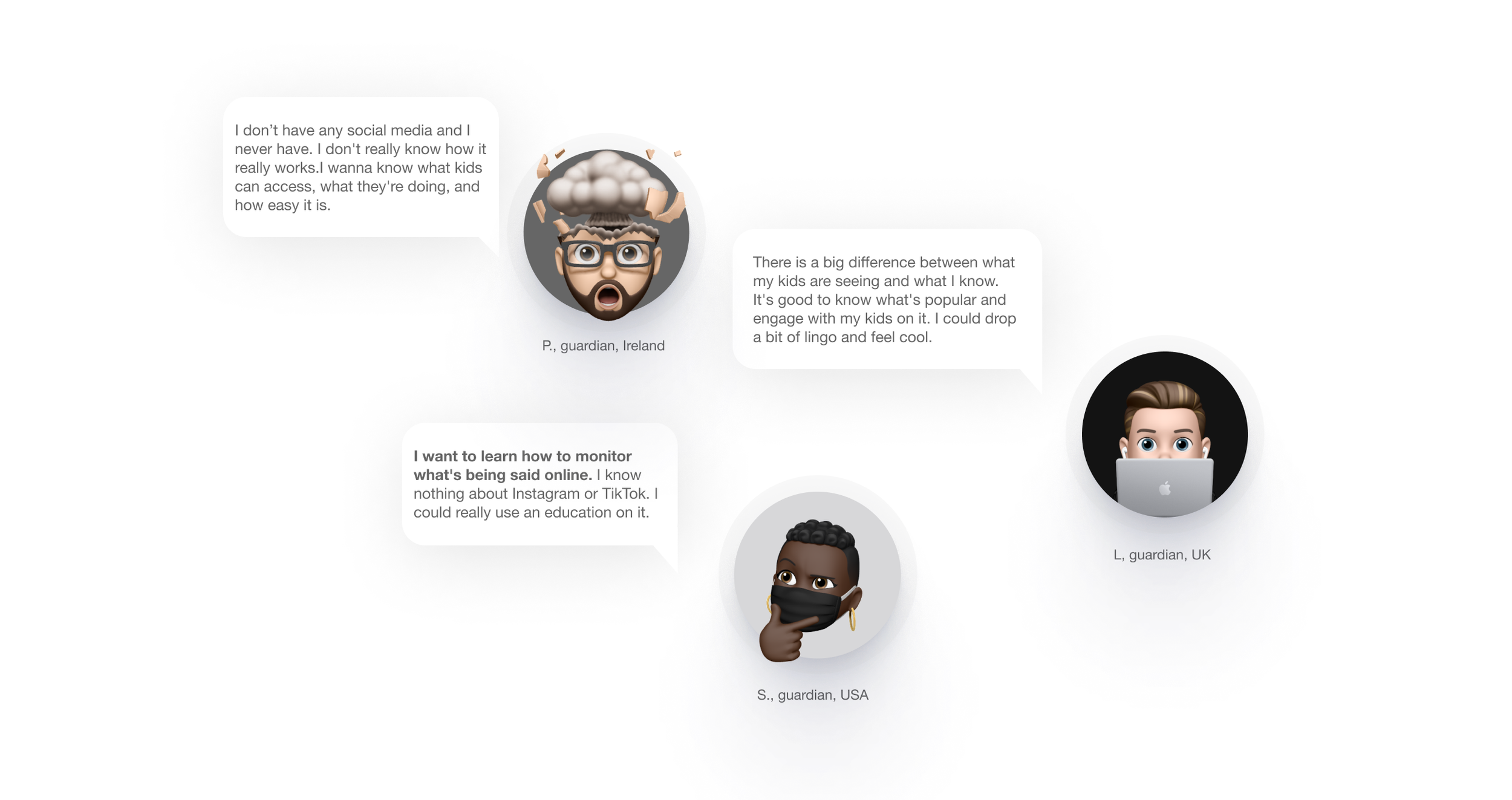
Guardians face challenges supervising their teens on social media due to limited technical knowledge and a lack of context about their teens' online experiences. Many feel behind on the technology their teens use and want clearer, easy-to-understand information about app features. Less than half of guardians feel comfortable navigating basic tech tasks. Even those with technical knowledge struggle to grasp the nuances of their teens' social media experiences. Teens, in turn, wish their guardians better understood their concerns, often feeling hesitant to discuss social tech because they believe their guardians “won’t understand.”
What we did:
We keep things simple and don’t add unnecessary features and insights.
We design education and materials in Education Hub to help guardians understand teen POV and experience.
We are building for multiple guardians, to accommodate multiple households configurations and to recognize the reality of digital guardianship
We can’t assume guardians use Facebook and so are exploring allowing supervision from other FOA or in a central place.
We intend to market supervision tools to those we identify might be parents in our FoA (e.g. via QPs) and in the spaces parents visit, such as parent groups.
Longer term, we are considering analog methods of educating guardians about supervision who might not have tech comfort/knowledge.
4. Enhance parent-teen communication
Conversations about social media often become adversarial. Teens feel distrusted when oversight is too high, leading to tension and reluctance to share, fearing consequences or unwanted probing. While guardians are mindful of privacy, they feel that objective third-party insights from apps can help de-escalate these discussions. Most teens report having a positive, trusting relationship with their guardians, but not all do. Therefore, it’s essential to create a baseline experience that safeguards teens, even if they can’t or don’t want to seek help from their guardians.
What we did:
We provide complete transparency to teens as to what guardians can see and do on Family Center.
We rely on insights over settings to facilitate conversation and potentially even teen self-monitoring.
We provide in-context conversation starters and other help to facilitate communication between guardians and teens ( WIP).
We acknowledge supervision is not appropriate or desired for all families and so also build teen support and raise baseline for safety and privacy
Sprint Concepts
Time Spent / P0
Problem: Only showing general screen time information to parents without details is not very helpful for time limits set up.
Opportunity area: - Limits for time spent - Data on where / how someone is spending time
Solution: To assist parents in making better time management decisions with their teens, provide a breakdown of detailed screen time information from teen activity and when it is most used.
Connections / P0
Problem: Parents want visibility into the connections their teen is making on Facebook
Opportunity area: Provide parents with supervision into the connections their teen is making on Facebook
Solution: Create a Connections section with visibility into Friends, Groups, Pages, Events and Pages their teen connects with.
Visibility into Security Settings / P0
Problem: Some teens may be new to the internet and not know best practices around account safety
Opportunity area: Provide parents with insight into the strength of their teens account security measures
Solution: Show strength of password, 2fac, and let parent know when unrecognized device signs in.
Visibility into Privacy Settings / P0
Problem: Some entities on Facebook that a teen would connect with are indicators of identity and interest which a teen may want more privacy over
Opportunity area: Provide a way for teens and parents to balance privacy with supervision
Solution: In the Teen onboarding flow, allow selections of which entities they want to share with their parents with Friends being selected automatically.
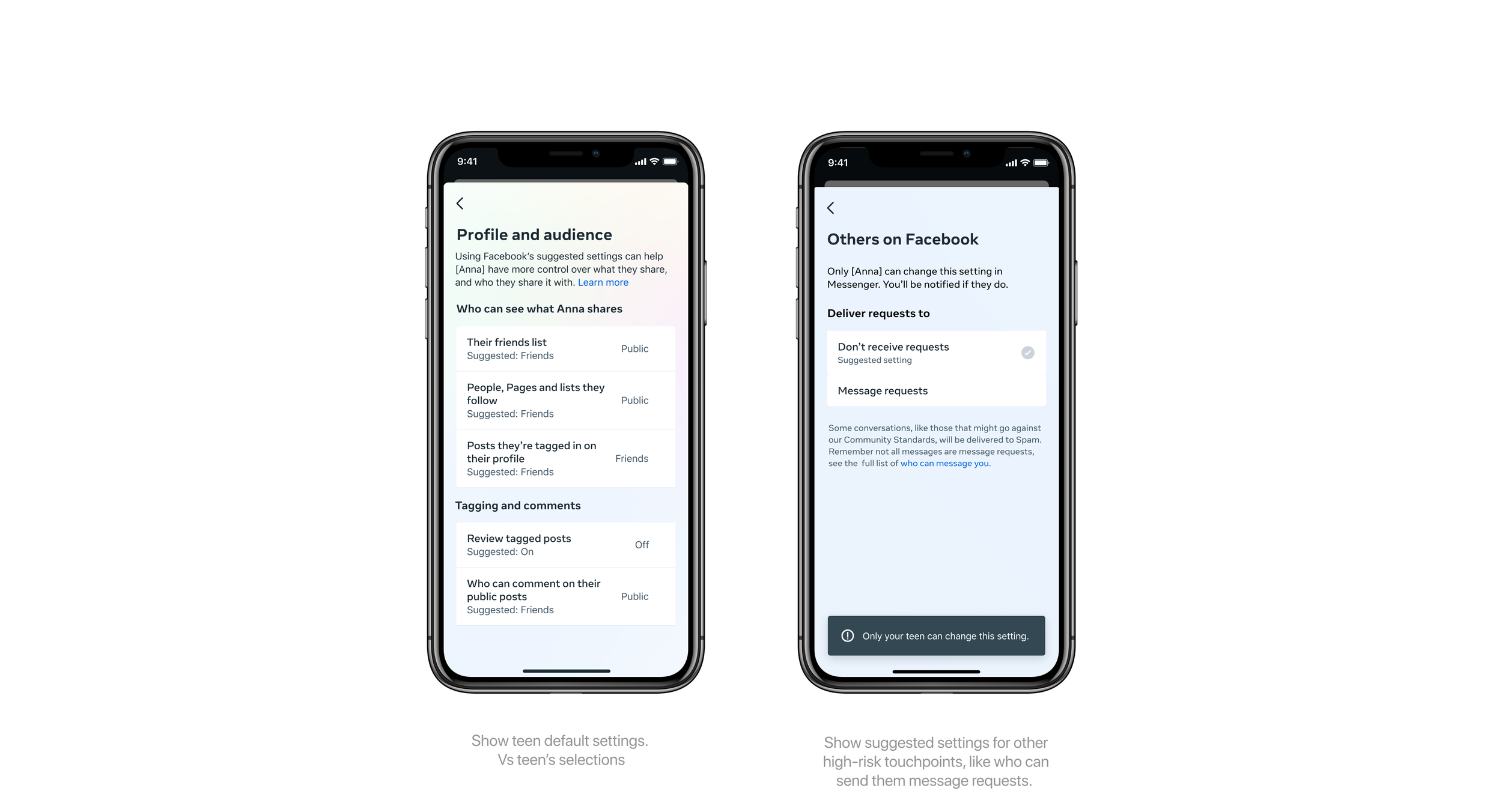
Settings recommendations / P0
Problem: Parents and teens may be unaware of our default privacy settings for teens, which minimize unwanted interactions and content exposure. Parents may also want visibility into the settings their teen has chosen, which is consistent with other supervision experiences.
Opportunity area: Raise awareness of our suggested settings to parents and highlight opportunities for teens to use safer settings.
Solution: Show default privacy settings in Family Center, alongside the teen’s selection for each setting.
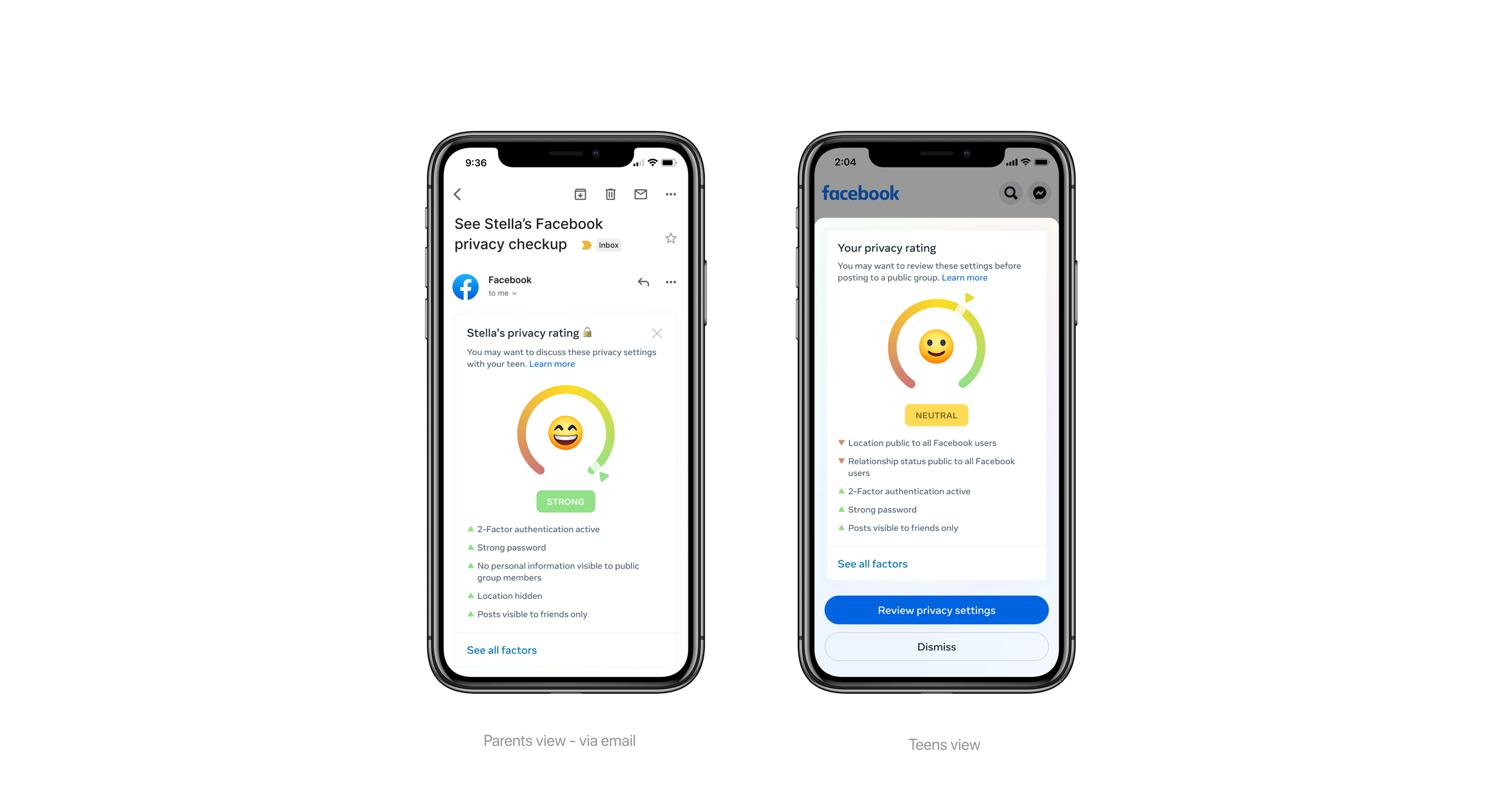
Privacy Rating / P1
Problem: Privacy settings can seem like an insurmountable configuration to address to people who haven’t visited the tool. They may not know what’s normal or what they should work towards.
Opportunity area: Privacy Checkup Expansion
Solution: Give explicit guidance on what marks are potentially disclosing too much, and nudge parents and teens to evaluate these settings at pivotal ‘first time’ moments in their Facebook experience.
Teen’s posts Insights / P1
Problem: Unwanted content expose problem for teens.
Opportunity area: User Insights
Solution: Teens will be given post insights and reminded of their privacy settings. Assist teens in avoiding further harm and provides the parents' side transparency.
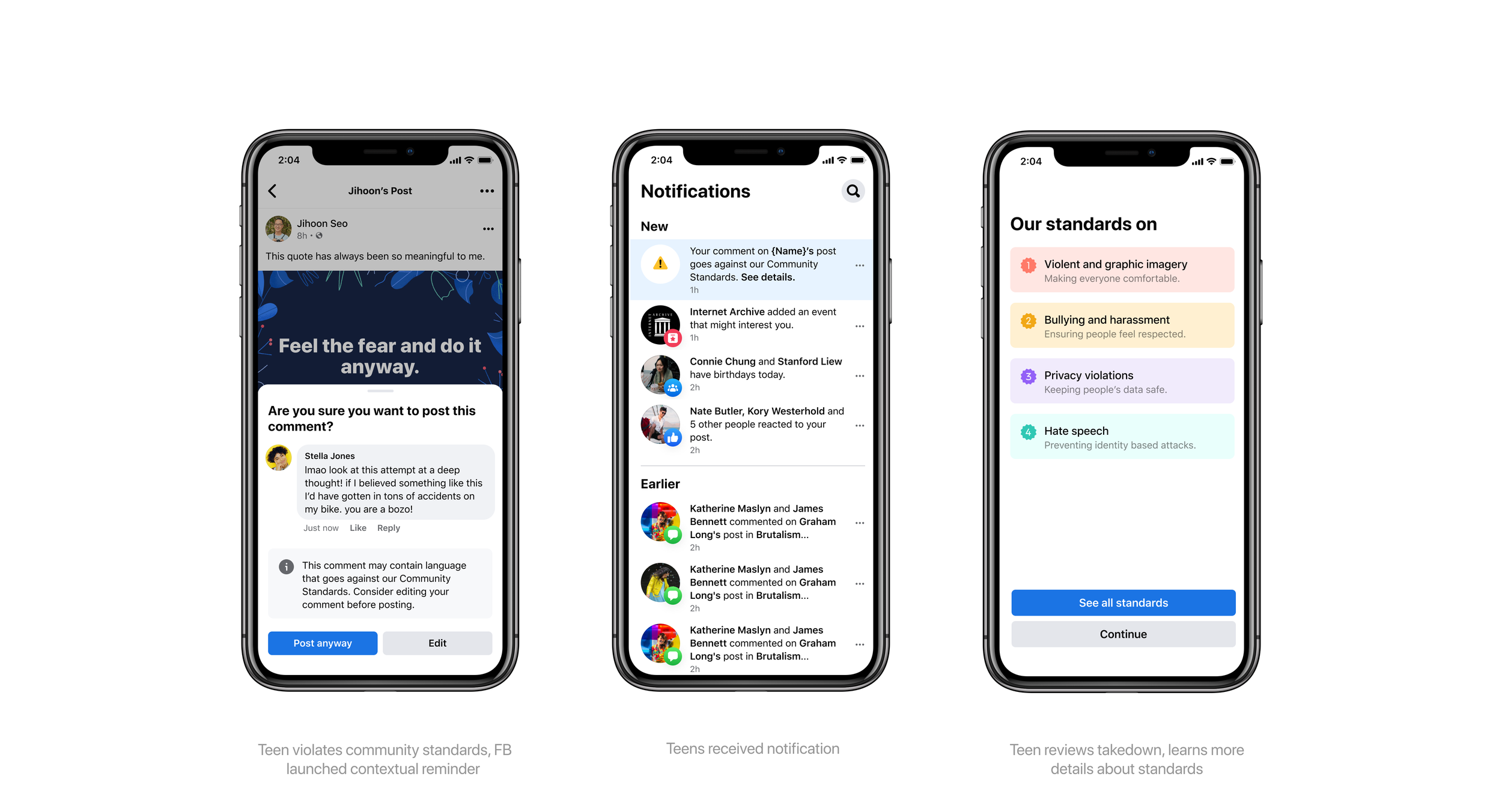
Trigger Community Standards Education / P2
Problem: Our community standards are often tucked away and not understood before engaging in activities on Facebook.
Opportunity area: Trigger education
Solution: Bring community standards education into the product experience in a way that prompts teen reflection and discussion between families.
Content Recommendation Reset / P2
Problem: Often people are intentionally or unintentionally drawn into rabbit holes or patterns of recommendations that can be harmful over time
Opportunity area: Sensitive content control
Solution: Give visibility into when this behavior might be forming, and provide corrective measures in the form of, Nudges, ‘New to you’ type content diversification and Resources for content evaluation
MVP Overview
Parents Experience: Focus on Family Center
The Family Center is the central area of the parent's side supervision experience. We are providing one place for parents able to gather enough data about their teens. Providing the right level of detail is the key. The intention is to promote conversation and find a solution as a family.
Teens Experience: Contextual & in the moment
For teenagers, Facebook supervision occurs frequently and in a more interesting setting when it is contextual.